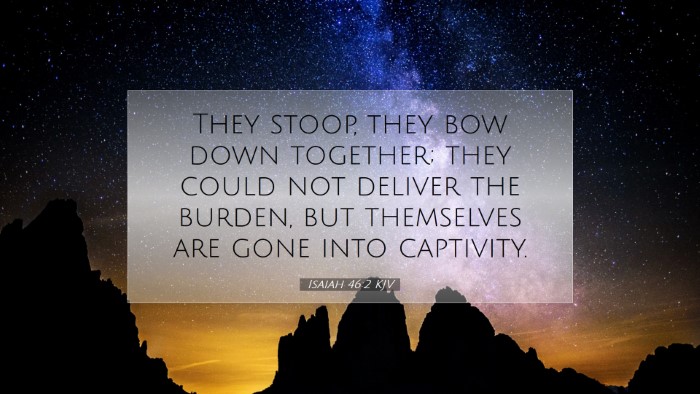Commentary on Isaiah 46:2
Bible Verse: Isaiah 46:2 - "They stooped, they bowed down together; they could not deliver the burden, but themselves are gone into captivity."
Introduction
Isaiah 46:2 depicts a critical moment in the prophetic declarations regarding the contrasting strength of God against the impotence of idols. The verse emphasizes the futility of relying on pagan deities and illustrates the broader themes of deliverance, captivity, and the sovereignty of God. This commentary draws upon various public domain sources to provide insights beneficial for pastors, students, and theologians.
Contextual Analysis
The book of Isaiah is prophetic literature that addresses both present realities and future hopes. Isaiah 46 occurs during a period when Israel was facing the threat of Babylonian captivity. Here, the prophet seeks to illustrate the utter inadequacy of idols, contrasting them with the Lord’s omnipotence.
Matthew Henry's Commentary
Matthew Henry provides a vivid portrayal of the effectiveness and ineffectiveness of idols. He states that the imagery of stooping and bowing illustrates the helplessness of these idols, which are creations of human hands. Henry notes:
- Humiliation of Idols: "They stooped, they bowed down together" implies that these gods are not only ineffective, but they also share in the human plight of bondage and defeat.
- Inability to Save: The phrase "could not deliver the burden" indicates that the idols themselves are unable to rescue those who worship them, ultimately leading to their downfall.
Albert Barnes' Notes
Albert Barnes further develops the implications of the text with important theological reflections:
- False Security: Barnes emphasizes that those who trust in false idols will find themselves in captivity not only physically but also spiritually, as these idols bring no real security.
- Cultural Relevance: His commentary contextualizes the historical setting, reflecting the belief systems of the time wherein many sought refuge in created beings rather than the Creator. This further affirms the need for deep faith in God alone.
Adam Clarke's Insights
Adam Clarke provides scholarly depth to the discussion, focusing on the metaphorical language of Isaiah:
- Metaphorical Interpretation: Clarke suggests that the act of "stooping" reflects both a literal and symbolic act of submission. Idols, which should be revered, become utterly powerless.
- Spiritual Application: The plight of these idols speaks to the larger human condition and the ultimate need for redemption, leading to a unified theme of dependence on the Almighty.
Theological Implications
This brief verse encapsulates major theological themes central to the Judeo-Christian worldview:
- Sovereignty of God: The Lord's supremacy is reaffirmed; unlike idols, He is powerful to save, sustaining His people in their time of need.
- Human Condition: The inability of idols to deliver reflects the broader human struggle with sin and the need for divine intervention.
- Call to Faith: This passage serves as an urgent beckoning for believers to abandon false securities and place their full trust in God.
Conclusion
Isaiah 46:2 challenges both ancient and modern audiences to critically evaluate their sources of hope and strength. The reflections from Matthew Henry, Albert Barnes, and Adam Clarke help illuminate the richness of the text, affirming that there is no salvation apart from God. For pastors, students, and scholars, the verse becomes a clarion call to recognize the futility of idolatry in any form, leading to a deeper reliance on the sovereign Lord who delivers from captivity.


